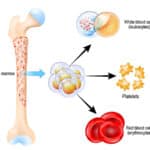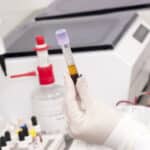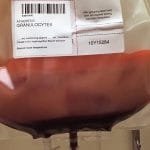Febrile transfusion reactions are no big deal, right? Christine Cserti-Gazdewich says, “Hold on! There’s more to the story!”
NOTE: Continuing Education credit for this episode has expired. See below for details.

Dr. Christine Cserti-Gazdewich
How SHOULD We Look at Them?
Christine Cserti-Gazdewich is a hematologist who is also certified in Blood Banking/Transfusion Medicine, and she sees febrile reactions a lot. She believes we are underestimating their impact in a big way. Christine is senior author on a 2017 paper that outlines the true cost of febrile reactions. While the monetary figures may not blow you away, the overall impact is significant! Christine takes us through a great discussion of how to recognize, understand, classify, and evaluate febrile reactions and appreciate their impact on patients.
About My Guest:
Christine Cserti-Gazdewich trained in internal medicine and hematology in Toronto, and in Transfusion Medicine at the Harvard Joint Program in Boston. She is an Assistant Professor at the University of Toronto, and a Transfusion Medicine specialist and a clinical hematologist at the University Health Network (UHN). She also provides remote associate medical directorship to other Ontario hospital transfusion services. Christine’s local work focuses on transfusion immunohematology and hemovigilance, with interests in the hematology and hemotherapy of severe anemia in sub-Saharan Africa. She was an investigator in the “TOTAL RCT” (on blood storage effects in the transfusion of profound pediatric anemia), and in a clinical field trial examining host blood group relationships and survivorship under Plasmodium falciparum malaria selection pressure.

Dr. Christine Cserti-Gazdewich
How SHOULD We Look at Them?
Christine Cserti-Gazdewich is a hematologist who is also certified in Blood Banking/Transfusion Medicine, and she sees febrile reactions a lot. She believes we are underestimating their impact in a big way. Christine is senior author on a 2017 paper that outlines the true cost of febrile reactions. While the monetary figures may not blow you away, the overall impact is significant! Christine takes us through a great discussion of how to recognize, understand, classify, and evaluate febrile reactions and appreciate their impact on patients.
About My Guest:
Christine Cserti-Gazdewich trained in internal medicine and hematology in Toronto, and in Transfusion Medicine at the Harvard Joint Program in Boston. She is an Assistant Professor at the University of Toronto, and a Transfusion Medicine specialist and a clinical hematologist at the University Health Network (UHN). She also provides remote associate medical directorship to other Ontario hospital transfusion services. Christine’s local work focuses on transfusion immunohematology and hemovigilance, with interests in the hematology and hemotherapy of severe anemia in sub-Saharan Africa. She was an investigator in the “TOTAL RCT” (on blood storage effects in the transfusion of profound pediatric anemia), and in a clinical field trial examining host blood group relationships and survivorship under Plasmodium falciparum malaria selection pressure.
Continuing Education Expired
This podcast episode offered continuing education credit for two years from its release date, but is no longer eligible for such credit.
To find Blood Bank Guy Essentials Podcast episodes with active continuing education opportunities, Click here or visit Transfusion News Continuing Education on Wiley Health Learning.
Further Reading:
- Paper discussed in this episode: Cohen R et al. Feeling the burn: the significant burden of febrile nonhemolytic transfusion reactions. Transfusion 2017;57;1674–1683.














So once your podcast get P.A.C.E certified, MTs and MLTs can use them as continuing education credits?? That sounds awesome! So excited for that! Great way to gain credits without falling asleep doing so!
Kelsey, that is exactly right! The hope and plan is that P.A.C.E. credits will start in November (fingers crossed!). I hope that will be the case, because lots of laboratorians have asked for this over the last two years. Thanks for listening!
-Joe
I have just started listening to Blood Bank guy podcast and absolutely love it. I look forward to being able to use that to get CE for my MLS certification. Can’t wait!
Thanks so much for listening! If you have the opportunity and you don’t mind, I’d be honored if you would click the link on this page for “Apple Podcasts” and give the show a rating in iTunes. Thank you again for your kind words.
-Joe
Thanks for creating such a wonderful platform for learning
I have just registered and start participating from now.
Thank you once again.
I will look at transfusion reaction with a batter insight.
If you know a patient has sepsis or are at high risk for fever why aren’t they asking for washed cells rather than wasting units
Stephanie, washing would likely do very, very little to improve that situation, in my view. It is possible, of course, to reduce the number of fever-inducing substances in a blood product by washing, but routinely doing so to prevent febrile reactions, including in those with sepsis, is not something most would routinely do. There are some transfusion medicine physicians who would agree with you, though, so I’m not discounting your thought at all; it’s just not something I routinely recommend.
-Joe
Hi Joe,
Another great podcast, Dr Christine Cserti-Gazdewich is a wonderful educator. Please bring Dr Cherti-Gazdewich back to speak about TACO, TRALI and TAD.
Christine is amazing! I couldn’t agree more, and stay tuned; you might hear her talking about something else soon!
-Joe